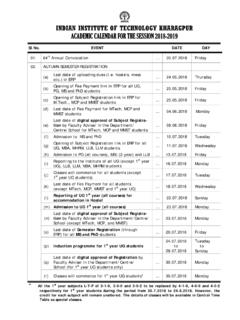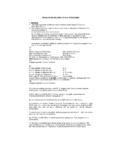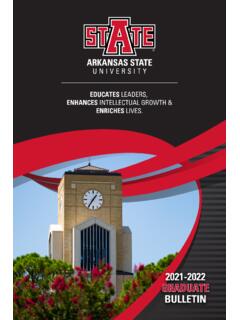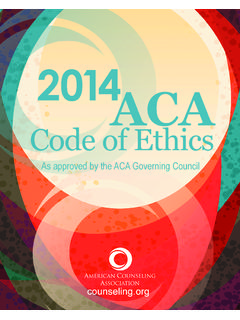Transcription of regulation UG updated oct 2020 - IITKGP
1 For (Hons.), Dual Degree, Interdisciplinary Dual Degree, B. Arch. (Hons.), Integrated M. Sc. Degrees, 2 Year of Joint - - 6 Year Dual Degree - Indian Institute of Technology Kharagpur Rules and Regulations updated June 2021 Page 1 CONTENTS Page No. Preface 2 1. Academic Administration 3 2. Academic Programs 3 3. Scope of the Regulations 6 4. Academic Calendar 7 5. Admission 7 6. Residence 8 7. Attendance 8 8. Conduct and Discipline 9 9. Change of Branch 11 10. Switch Over to Interdisciplinary Dual Degree Programs 13 11. Allocation of Verticals for QEDM 13 12. (Hons.) to Dual Degree Switch Over 13 13. Options for Dual Degree Specialization 14 14. Course Curricula 14 15. Co-ordinated Courses 18 16. Industrial Training and Field Work 18 17. Additional Credits 19 18. Micro-Credits 20 19. Minor in a Discipline 20 20. Micro Specialization 21 21. Admission to for Joint Program 21 22.
2 Semester Registration 22 23. De-Registration 25 24 Grading System 25 25. Assessment of Performance 26 26. Assessment of Project Work 29 27. Examinations 30 28. Supplementary Examination 32 29. Summer Quarter 34 30 Grade Submission & Grade Revision 35 31. Graduation Requirement 36 32. Promotion and Discontinuation of Study 37 33 Withdrawal from the Institute 38 34. Striking off the name from Institute Roll List 38 35. Relaxation 38 36 Medals, Awards and Prizes 39 37. Scholarships 51 38. Appendix 1 ---Subjects in Lieu of BTP Projects 67 Rules and Regulations updated June 2021 Page 2 PREFACE The Indian Institute of Technology at Kharagpur is the first of the sixteen Institutes established in the IIT system. Established in 1951, IIT Kharagpur stands tall for its excellence in Academics and Research with top class faculty. With 19 Academic Departments, 7 Centers & 8 Schools of Excellence, the Institute offers 15 (Hons.)
3 Programs, 38 Dual Degree Programs, 2 Interdisciplinary Dual Degree Programs, 6 Integrated Programs and 5 Two Year degree programs of Joint The Undergraduate courses at IIT Kharagpur are known for their academic depth and professional learning flexibility, imbibed with options to earn minor or extra credits. Having an apt mix of basic sciences, engineering sciences, professional core of the major discipline, humanities courses, management subjects, project work, open electives and industrial training, the courses give a professional edge to the students. The system stimulates broad spectrum learning. Extra Academic activity is a non credit component of the curriculum that not only helps the students in character and personality building but also in understanding the needs of the society and contributing in an effective way to meet these social challenges.
4 IIT Kharagpur follows a credit based semester system. There are two Semesters in an academic year (Autumn: July - November; and Spring: January - April) during which all courses specified for various degree programs are offered. There is one additional term of seven week duration during summer, for the theory subjects of the first year to offer additional training to students who do not clear these subjects. The Institute has recently launched an International Summer /Winter Term Program which is open to all students. The students get an opportunity to seek knowledge and experience from International faculty in various multi-disciplinary subjects. IIT Kharagpur is a very student friendly place and all efforts are made to ensure that the students are provided the best opportunities that are needed to create outstanding pool of human resources to meet the global challenges in all spheres.
5 The students are required to follow certain procedures and meet specified academic requirements each semester. This booklet gives comprehensive information on the existing Rules and Regulations for (Hons.), Dual Degree and Programs. We urge the students to make best use of the world class infrastructure and facilities available at IIT Kharagpur and wish all of them all the very best for a successful career. Dean (UGS) Rules and Regulations updated June 2021 Page 3 1. Academic Administration The Senate is a statutory and supreme body that governs all academic matters of the Institute, and the rulings of Senate Chairman (Director of The Institute) are final in regard to all academic issues. A definite time schedule is set by the Senate for various academic activities, through an Academic Calendar issued in the beginning of each academic year.
6 The Senate continuously assesses the Academic Programs and makes appropriate revisions/ modifications/improvements as and when required through three Institute level Senate subcommittees: The Under-Graduate Program Evaluation Committee (UGPEC) for undergraduate programs, the Post-Graduate Program Evaluation Committee (PGPEC) for post-graduate programs, and the Research Program Evaluation Committee (RPEC) for research programs. Administrative back-up and support for all academic activities is provided by the Academic Section and the ERP system of the Institute. On joining the Institute, students of each discipline are assigned to a Faculty Advisor from their Department. Faculty Advisors assist the students on matters relating to their academic performance and the courses they may take in various semesters. Dean (Undergraduate Studies) and Dean (Students affairs ) are the two Chief Academic Authorities for the Undergraduate (UG) Programs.
7 All the UG Academic matters come under the purview of Dean (Undergraduate Studies). Matters pertaining to conduct, discipline and welfare of the students are overseen by the Dean (Students affairs ). 2. Academic Programs The following Undergraduate Programs are Offered by the Institute: (i) 4-year courses in Engineering / Technology leading to the award of (Hons.) Degree. (Table ) (ii) 5-year Integrated courses in Engineering / Technology leading to Dual (Hons.) and Degrees. (Table ) (iii) 5-year Integrated courses in Engineering / Technology leading to Interdisciplinary Dual (Hons.) and Degrees. (Table ) (iv) 5-year course in Architecture leading to the award of (Hons.) degree. (v) 5-year Integrated courses in Science subjects leading to the award of both and Degrees. (Table ) (vi) 6-year Integrated courses in Science/Technology leading to Dual and Degrees (Table ) (vii) 2 Year courses of Joint Degrees in Science subjects leading to the award of Degrees.
8 (Table ) (viii) 3 Year of Joint Degrees in Science subjects leading to the award of Degrees. (Table ) Rules and Regulations updated June 2021 Page 4 TABLE 4-year courses in Engineering/Technology leading to the award of (Hons.) Degree Sl. Courses 1. Aerospace Engineering 2. Agricultural and Food Engineering 3. Biotechnology and Biochemical Engineering 4. Chemical Engineering 5. Civil Engineering 6. Computer Science and Engineering 7. Electrical Engineering 8. Electronics and Electrical Communication Engineering 9. Instrumentation Engineering 10. Industrial Engineering 11. Manufacturing Science and Engineering 12. Mechanical Engineering 13. Mining Engineering 14. Metallurgical and Materials Engineering 15. Ocean Engineering and Naval Architecture TABLE 5-year Integrated courses in Engineering/Technology leading to Dual (Hons.)
9 And Degrees Sl. Courses 1. (Hons.) & in Aerospace Engineering 2. B. Tech.(Hons.) in Agricultural and Food Engineering & M. Tech. in Food Process Engineering 3. B. Tech.(Hons.) in Agricultural and Food Engineering & M. Tech. in Land and Water Resources Engineering 4. B. Tech.(Hons.) in Agricultural and Food Engineering & in Farm Machinery and Power 5. B. Tech.(Hons.) in Agricultural and Food Engineering & in Aquacultural Engineering 6. B. Tech.(Hons.) in Agricultural and Food Engineering & in Agricultural Systems and Management 7. B. Tech.(Hons.) in Agricultural and Food Engineering & in Agricultural Biotechnology 8. (Hons.) & in Biotechnology and Biochemical Engineering 9. (Hons.) & in Chemical Engineering 10. (Hons.) in Civil Engineering & in Structural Engineering 11. (Hons.) in Civil Engineering & in Transportation Engineering 12. (Hons.) in Civil Engineering & in Geotechnical Engineering 13. (Hons.)
10 In Civil Engineering & in Hydraulic and Water Resources Engineering 14. (Hons.) in Civil Engineering & in Environmental Engineering and Management 15. (Hons.) & in Computer Science and Engineering Rules and Regulations updated June 2021 Page 5 16. (Hons.) in Electrical Engineering & in Control System Engineering 17. (Hons.) in Electrical Engineering & in Machine Drives and Power Electronics 18. (Hons.) in Electrical Engineering & in Power and Energy Systems 19. (Hons.) in Electrical Engineering & in Instrumentation and Signal Processing 20. (Hons.) in Electronics & Electrical Communication Engineering & in Microelectronics and VLSI Design 21. (Hons.) in Electronics & Electrical Communication Engineering & in RF and Microwave Engineering 22. (Hons.) in Electronics & Electrical Communication Engineering & in Telecommunication System Engineering 23. (Hons.) in Electronics & Electrical Communication Engineering & in Visual Information and Embedded Systems 24.















